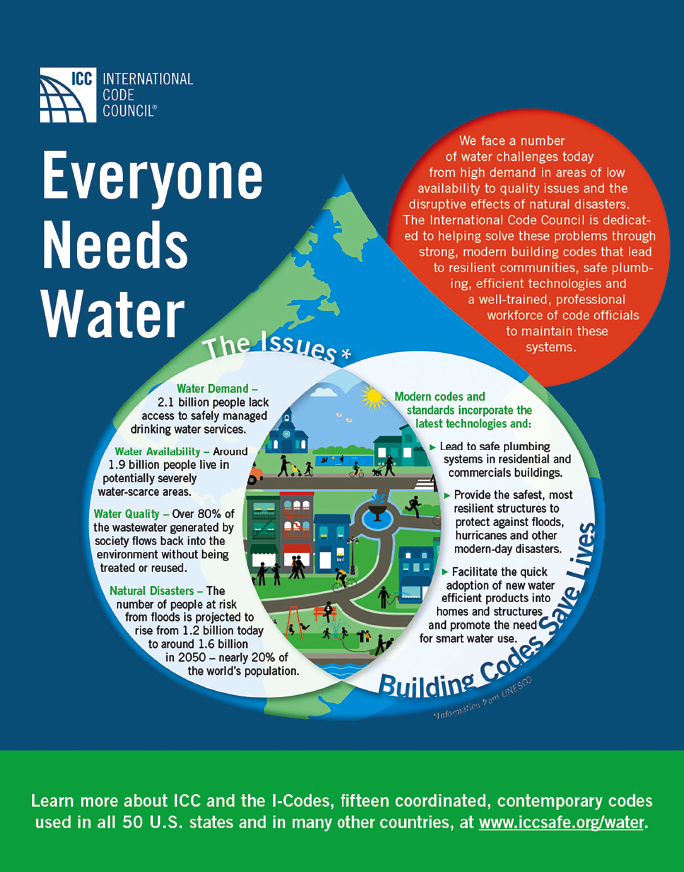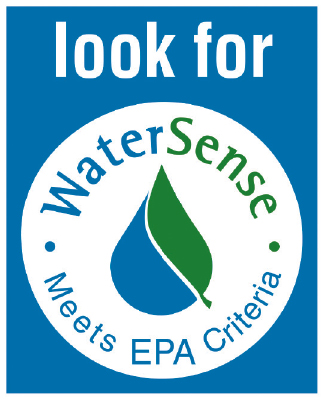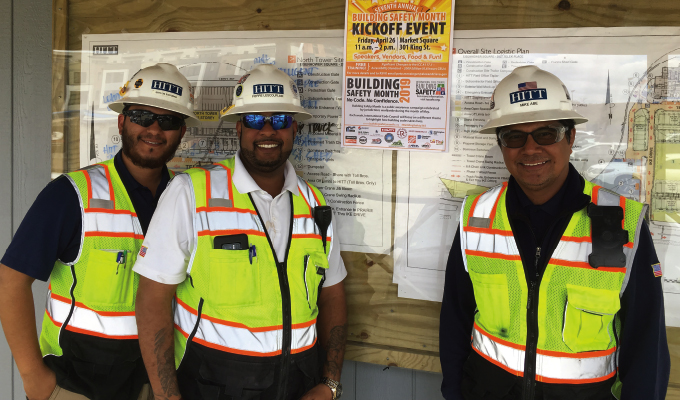By Dominic Sims, International Code Council
Although 70 percent of our planet is covered with water, less than one percent is drinkable. Clean water is the world’s most precious commodity and accessing it is still a challenge for many populations around the globe. To ensure populations have access to clean water as they grow, the International Code Council, in addition to many jurisdictions, manufacturers, and organizations, are working to improve water conservation, label new homes and structures as more water efficient, and spread the word about the need for smart water use.
According to the World Economic Forum, 2.2 billion people currently do not have access to clean drinking water. And the World Health Organization (WHO) estimates that by 2025, half of the world’s population will be living in water-stressed areas. The Flint, Michigan, water emergency and drought in South Africa are just two examples that shine a spotlight on a growing global issue. Not only is water vital to our communities and economy, it is also important for public health.
Now is the time to band together to create solutions to provide greater accessibility to safe and clean water. Here are a few ways to help promote water conservation and efficiency:
HARVEST RAINWATER
One significant way to conserve water and use it more efficiently is through rainwater harvesting. This method captures, diverts, and stores rainwater from a structure or surface in order to store it for later use. However, while modern rainwater harvesting systems have not yet become commonplace in North America, in many locations with constrained or contaminated sources, interest in the use of rainwater harvesting systems for both potable and non-potable use has grown in recent years.
With the recent publication and release of the 2021 International Plumbing Code® (IPC®), the CSA B805/ICC 805 standard was included as an alternative for collection and distribution systems using rainwater. Furthermore, this same standard will be part of the 2021 International Residential Code® (IRC®), which is slated to be published later this year. This CSA B805/ICC 805 standard addresses roof surface rainwater and stormwater being used as source water for single-family, multi-residential, and non-residential environments. It also addresses non-potable applications like irrigation, fire protection, toilet and urinal flushing, and vehicle washing. In addition, potable applications such as food preparation, dishwashing, and bathing are also included where permitted by the applicable jurisdiction.
APPLY THE MOST MODERN BUILDING CODES
Another way to ensure water is being used efficiently is to implement the most modern, up-to-date plumbing codes. Modern building codes lead to resilient communities, safe plumbing and efficient technologies. Plumbing professionals and well-trained code officials maintain these systems and ensure our communities have safe, accessible water.
Plumbing codes help ensure the proper performance of plumbing systems in residential and commercial buildings. For example, the International Plumbing Code incorporates innovative technologies and detailed engineered designs that permit the installation of smaller, more precise water usage and water drainage systems, resulting in the savings of millions of gallons of water. Most recently, the Code Council and the Residential Energy Service Network (RESNET) partnered to develop a joint standard accredited by the American National Standards Institute—ANSI/RESNET/ICC 850-2020 Standard Calculation and Labeling of the Water Use Performance of One-and Two-Family Dwellings Using the Water Rating Index. This standard helps communities with water conservation efforts by setting technical specifications for inspections, testing and ratings of home water efficiency.
Plumbing codes are also critical for emergency situations like the current pandemic. For example, code officials ensure that healthcare infrastructure, including temporary structures and occupancies, are built and maintained to ensure safety. From adequate facilities to ensure handwashing to safe and sanitary plumbing systems that mitigate the spread of contagions and much more, the role of code officials and inspectors remains vital.

LOOK FOR THE WATERSENSE LABEL
In partnership with the U.S. Environmental Protection Agency’s (EPA’s) WaterSense Program, the ICC Evaluation Service, LLC® (ICC-ES®) PMG Listing Program aims to help identify water efficient products that meet EPA’s criteria for efficiency and performance. To receive WaterSense certification, products undergo rigorous testing for efficiency and performance.
Since its inception in 2006 through 2018, WaterSense has helped Americans save a cumulative 3.4 trillion gallons of water and more than $84.2 billion in water and energy bills, according to the EPA. Additionally, the use of WaterSense labeled products saved 462.5 billion kilowatt-hours of electricity.
PROMOTE WATER SAFETY
In an effort to increase awareness, this past Building Safety Month—an educational, interactive campaign that takes place each May presented by the Code Council to help promote the importance of building safety—devoted an entire week to bringing awareness to the importance of water safety and urging action to ensure clean water through proper construction, conservation and safe disposal.
No matter the time of year, it’s important for us to implement water conservation and efficiency methods to ensure the health and well-being of all.

ABOUT WATERSENSE
WaterSense, a voluntary partnership program sponsored by the U.S. Environmental Protection Agency (EPA), is both a label for water-efficient products and a resource for helping you save water.
The WaterSense label makes it simple to find water-efficient products, new homes, and programs that meet EPA’s criteria for efficiency and performance. WaterSense-labeled products and services are certified to use at least 20 percent less water, save energy, and perform as well as or better than regular models.
ABOUT THE AUTHOR
Dominic Sims is chief executive officer of the International Code Council. The International Code Council is a nonprofit association that provides a wide range of building safety solutions including product evaluation, accreditation, certification, codification, and training. It develops model codes and standards used worldwide to construct safe, sustainable, affordable and resilient structures. For more information, visit www.iccsafe.org.
MODERN PUMPING TODAY, June 2020
Did you enjoy this article?
Subscribe to the FREE Digital Edition of Modern Pumping Today Magazine!



